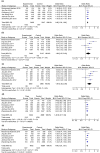Association between an indel polymorphism within the distal promoter of EGLN2 and cancer risk: An updated meta-analysis
- PMID: 31414584
- PMCID: PMC6785434
- DOI: 10.1002/mgg3.936
Association between an indel polymorphism within the distal promoter of EGLN2 and cancer risk: An updated meta-analysis
Abstract
Background: The association between a 4-bp indel polymorphism (rs10680577) within the distal promoter of EGLN2 and cancer risk has been investigated by several case-control studies in recent years, but investigation results were inconsistent. Thus, a systematic assessment of the association was performed based on a literature review and pooled analysis.
Methods: Two investigators independently retrieved relevant studies from PubMed, Chinese National Knowledge Infrastructure (CNKI), Embase, and Google Scholar. The fixed or random effects model was selected to calculate odds ratios (ORs) with 95% confidence intervals (CIs) based on heterogeneity level. All analyses including heterogeneity assessment, subgroup analysis, sensitivity analysis, and publication bias assessment were performed using RevMan 5.3 software and Stata 12.0 software.
Results: A total of six relevant studies with 3,406 cases and 5,147 controls were included in the final analysis. The overall pooled analysis showed that EGLN2 rs10680577 polymorphism was significantly associated with cancer risk under all genetic models. However, subgroup analysis based on cancer type showed that the polymorphism was significantly associated with the risk of digestive system cancer under all genetic models, and with the risk of lung cancer under dominant model, heterozygote comparison model, and allele comparison model. Subgroup analysis based on population sources showed a significant association in Chinese population under all genetic models.
Conclusion: The present result suggests that EGLN2 rs10680577 polymorphism is associated with cancer risk, and may act as a promising predictive biomarker for cancer risk, especially in Chinese population. However, further well-designed studies are warranted to confirm these results.
Keywords: EGLN2; cancer; polymorphism; risk.
© 2019 The Authors. Molecular Genetics & Genomic Medicine published by Wiley Periodicals, Inc.
Conflict of interest statement
The authors declare no conflict of interest.
Figures



References
-
- Erez, N. , Milyavsky, M. , Eilam, R. , Shats, I. , Goldfinger, N. , & Rotter, V. (2003). Expression of prolyl‐hydroxylase‐1 (PHD1/EGLN2) suppresses hypoxia inducible factor‐1alpha activation and inhibits tumor growth. Cancer Research, 63(24), 8777–8783. - PubMed
Publication types
MeSH terms
Substances
LinkOut - more resources
Full Text Sources

